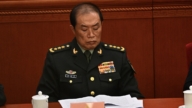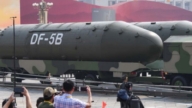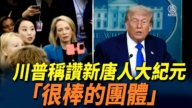【新唐人2012年9月8日讯】最近,中国大陆的十八大“维稳”风吹向股票市场。据说,证监系统已经动员全方位的股市维稳工作。在目前中国经济增速持续下滑﹔股市长期委靡不振、股市投资者信心不足情况下,当局的措施能起什么作用?有回春的契机吗?
在周三两市大盘低开后,沪指再创今年新低,量能仍然萎靡不振。而当天的报导说,A股跌跌不休,10日均线反压,短期还有整固需求﹔大势研判“市场情绪依然悲观,短线2000点有待考验”。
当晚中共喉舌《中国网》题为“证监会部署十八大维稳工作 要求确保市场稳定”的报导中说,日前,证券期货监管系统,召开了维稳工作视频会议,证监会主席郭树清下达“维稳”动员令。
据报导,各地证监系统紧锣密鼓展开相关工作﹔监管部门日前就股市现状征求业内意见,希望券商能找到“中国股市上涨的理由”﹔北京地区券商最近也不断接到监管通知,要求研究市场走势,并总结对当前市场的“积极观点”。
在当局积极维稳布局之下,7号午后,沪深股市指数果然呈现冲高小幅回落走势。收盘后,沪指涨幅3.72%﹔深成涨幅5.08%。两市成交量都是前一天的2倍多。
原“中国社科院金融发展室”主任、经济学家易宪容指出,目前的问题在于,当局没有提出振兴股市的政策,而股市投资者长期以来都在亏损。
原“中国社科院金融发展室”主任易宪容:“主要还是,政府对股市操纵的太厉害,然后,政府既然可以操纵股市,它就可以通过政府对股市的操纵把利益输送,幕后交易就太多。当然他短期搞几天,对,有一点影响﹔但反弹,没那么容易。这投资者不会听信他们说什么,都没信心。一进去我就亏,我进去干嘛?”
有报导说,历史经验指出,证监系统维稳不是“作文比赛”,过去曾2次酝酿出一波反弹行情。不难看出,意在吹捧。
但,旅美中国经济学者,“普林斯顿大学”社会学博士程晓农分析,目前,中共十八大权力斗争激烈,远远超出一般百姓的想像﹔双方恐怕关注的都是如何生死搏斗,不太可能有精力关心股市问题。目前,证监会下达指令“维稳”,可以解读为“推动股市”。
旅美中国经济学者 程晓农:“但同样可以有另外一种解读,那就是怕股市崩盘。我认为是后一种,因为崩盘会造成股民的恐慌。中共现在希望十八大权力斗争关键时刻,不要再出现任何影响社会恐慌的因素,崩盘就是股民失去信心,抛盘了。中共并不是替股民着想,而是怕自己面子不好看。”
大陆沪指从1992年100点开始,到2004年约在1千点上下﹔然后,一年之间指数跳上2千点﹔到了07年指数疯涨到7千点,之后崩盘回跌到2千点。程晓农指出,主要原因是,中共让这些公司上市的主要目地,是圈小股东的钱﹔实际,上市公司的经营状况普遍不良,多数公司不分红。
程晓农:“所以,等于中共通过股市圈了大批的钱,但是严重伤害了小股民的利益。07年的股市暴涨有中共官方炒作的因素。当时把几家大国有银行,让西方金融机构首先购买上市股票,拉抬股市吸引小股东进场以后,西方大公司再抛股,然后股市就暴跌。所以可以讲,07年的股市暴涨本身是不正常的,中共的股市能维持2000点已经不错了。”
沪深股市7号的价量齐涨,是利好消息吗?
程晓农不认为。反之,他认为,中国目前全是利坏消息。因为大陆整个经济进入衰退、经济成长率下降、投资过剩、企业的资金周转不灵、企业处在亏损边缘。程晓农提醒股民,个别公司通过炒作,制造一点小幅度上涨的幻觉,不能作为判断目前整个股市的根据。
采访编辑/梁欣 后制/孙宁
China Stock Market Now Subjected to “Stability Preservation”
“Stability preservation” policies have now
been expanded to the Chinese stock market.
The Securities and Futures Commission (SFC)
has launched a full-scale deployment in the sector.
China is now seeing a declining economy, a long-term
weak stock market, and stock investors losing confidence.
Will this new measure taken by the Chinese Communist
Party (CCP) work? Will China’s stock market be revived?
On September 5, Shanghai stocks hit their lowest
point this year, and trading volumes remained weak.
Media reported the A-share index kept dropping that day,
Need 10 days to backup continuously and to fix in short term.
Industry analysts said, “The stock market remains pessimistic.
the short-term 2000 points will be tested.”
That evening, ‘china.com.cn’, a CCP website, reported
news assuring preserving the stability of the stock market.
Securities and futures management sectors were convened
to “maintain stability”, an order commanded by Guo Shuqing.
Guo is Chairman of China Securities Regulatory Commission.
Media reported that Chinese regulators are now seeking
industrial solutions to boost the stock market.
They hope stock brokerage firms can find “the reasons
why China’s stock market is expected to rise”.
Beijing-based stock brokerage have constantly
been informed to analyze market movement.
They are required to summarize “positive views”
from the current stock market situation.
On September 7, under the official policy
of “stability preservation”, the Shanghai and Shenzhen stock index, began to rise slightly.
That day, the Shanghai Composite Index rose by 3.72%,
and the SZSE Component Index rose by 5.08%.
Both markets’ trading volumes doubled
compared with the previous day.
China’s economists Yi Xianrong remarks that
the main question is that the authorities haven’t proposed any policy on boosting the stock market.
For a long time, Chinese stock investors have made losses.
Yi Xianrong: “The main problem is that the government
have manipulated too much on the stock market.
This transfers benefits and give
rise to lots of backroom deals.
This technique can play a small role for several days,
but it won’t help to re-boost the whole market.
Stock investors aren’t blindly believing what official says.
They have all lost confidence now, so just wait and see.”
Chinese media said that experience from history proved that
the SFC’s stability maintenance was not an “essay contest".
News reports alleged that two predictions were made
in the past to created waves of bounces.
Cheng Xiaonong, US-based economic scholar, says
that CCP infighting ahead of the 18th Congress has intensified more than Chinese people can imagine.
Both sides are focusing on a life-or-death power struggle.
They are less likely to care about stock market issues.
Dr Cheng thinks the current SFC’s “stability preservation"
of the stock market can be seen as “propelling the market”.
Cheng Xiaonong: “There’s another understanding
to it. They fear a stock market crash.
I believe this the true reason, as the crash
can lead to panic amongst stock investors.
At such a critical moment during infighting, the regime
has been trying to prevent the occurrence of any turmoil.
The CCP is not actually considering stock investors,
but fearing the negative effect on its appearance.”
China’s stock index started at 100 points in 1992.
It reached around 1,000 points in 2004,
and jumped to 2,000 points within one year.
Until 2007, the stock index soared to 7,000 points,
but then later plummeted to 2,000 points.
Dr. Cheng Xiaonong explained the main reason behind it.
The CCP approval of companies to be listed
aimed to circle the money of the small shareholders.
In fact, these listed companies have
generally been in poor operation.
Most of them do not pay dividends, Dr. Cheng reveals.
Cheng Xiaonong: “That is to say, the CCP has circled
a huge amount of money through the stock market.
But that has seriously hurt the interests of small shareholders.
The stock market’s boom in 2007 has links to official hype.
Firstly, the regime used Western financial institutions
to buy listed stocks of large state-owned banks.
This lured minority shareholders to enter the stock market.
Western financial institutions sold stocks,
and the stock market thus plummeted.
So, the 2007 boom is unnatural. 2000 points would
be a good level for a stock market supervised by the CCP."
On September 7, trading volumes in both the Shanghai
and Shenzhen stock markets rose. Is this good news?
Cheng Xiaonong does not think so.
On the contrary, he believes that all news
released so far in China is unfavorable.
This is because the entire economy
in China has slowed down.
Its economic growth rate declined,
and investments are excessive.
Enterprises in China are facing insufficient cash flow
problems, and are on the brink of making a loss.
Cheng Xiaonong warns Chinese stock investors
that the stock index may exhibit a small rise,
but that is an illusion created by the hype from some
individual stock brokerage firms.
It cannot become the criteria for judging
the entire stock market movement.





























